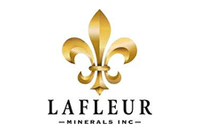Visible Free Gold in Thin-Section from Renforth’s Discovery Vein
Renforth Resources Inc. (CSE – RFR) (“Renforth” or the “Company”) is pleased to announce that during recently completed thin-section petrographical work on the Discovery Veins at New Alger several grains of visible free gold were reported.
Renforth Resources Inc. (CSE:RFR) (“Renforth” or the “Company”) is pleased to announce that during recently completed thin-section petrographical work on the Discovery Veins at New Alger several grains of visible free gold were reported.
Petrography Study Findings Summarized;
- Presence of free gold proven in Discovery Veins
- Discovery Vein system is pegmatitic and located in the Pontiac Sediments, a similar setting to the Canadian Malartic Mine approximately 25 km east
- Discovery Vein System is genetically similar to Thompson-Cadillac Mine Area Veins
- Petrographic observations gave a composition dominated by brown to green tourmaline identified as a low iron dravite in association with potassic feldspar, aluminous silicates (sillimanite+cordierite) and biotite.
“The petrographic study is an important step which gives us a deposit model and a project comparison in that New Alger, with the characteristics and setting of the Discovery Veins in the Pontiac, similar to gold zones of the Canadian Malartic Mine according to literature. Having a deposit model will inform our future exploration as we continue to develop this property,” states Nicole Brewster, President and CEO of Renforth.
The purpose of this petrographic study was to better understand the gold environment at the Discovery Veins and to make a comparison to the Thompson-Cadillac Mine Area gold mineralization. The Pontiac northern contact corresponds to the Cadillac Fault footwall. About 25 km eastward from the New Alger property, a similar environment hosts the Canadian Malartic deposit. The thin section study was done on 5 representative slab samples taken from Discovery Vein channel sample locations.
Discovery Vein Context
Recent stripping uncovered the Discovery vein system over a strike length of about 230 metres inside a tightly folded sub-vertical deformation zone hosted in Pontiac Group sediments. The grey-blue quartz parallel ribbons package observed at surface has an apparent thickness of 1 to 5 metres. The Discovery Fault, transecting the Discovery Vein with a north-west orientation, is suspected to control vein thickening and gold enrichment. Historic trenches located immediately west of the fault revealed veining swell related to tectonic brecciation.
Visible Free Gold Sample DISC-01
This sample was taken adjacent to a channel sample grading 0.32 g/t Au over 1m comprised of laminated quartz. Gold grains measuring 20 to 30 µm were observed in the sample centered on a centimetric vein controlled by a bedding joint. The surrounding wacke is weakly deformed but bleached by feldspathic alteration over a metric interval. Gold grains are free, located on quartz-chlorite grains joints in association with pyrrhotite. This observation is preliminary but suggests that a part of the gold grade may be relatively coarse and free from sulfide attachment.
Petrographic Observation Overview
- The sedimentary host rock has recorded a polyphased alteration that followed the prograde-retrograde metamorphic cycle. Gold deposition occurs with disseminated early prograde arsenopyrite mineralization and free gold particles are associated with late retrograde chlorite.
- Field mapping had already identified schistosed green shear zone following a general east to north-east orientation sub-parallel to pegmatitic veins. Petrographic observations gave a composition dominated by brown to green tourmaline identified as a low iron dravite in association with aluminous silicates (sillimanite+cordierite). Dravite is a tourmaline type commonly observed and used as an indicator mineral for gold deposit in metamorphic terrains.
- The sillimanite+cordierite assemblage is a standard combination of indicator minerals used to support the identification of amphibolite metamorphic facies limits on a map.
- Potassic feldspar replacement is the main alteration event observed close to veins taking the form of an erasure of primary structures and mineral assemblages by a fine to coarse granular K feldspar. Late tectonic, un-oriented biotite is the other event observed in all samples, cross cutting all predecessor fabrics (bedding and foliation). Finally, the chlorite+biotite assemblage, typical of lower greenschist metamorphic conditions, affects predecessor minerals, being mainly located in micro-structures: shear bands, pressure-solution joints and fractures.
Similarity to Thompson-Cadillac Mine Area
The vein system is pegmatitic, i.e showing a coarse, generally un-oriented crystallization structure composed of quartz, potassic feldspar, biotite, and aluminium silicates identified as cordierite and tourmaline.
These vein types were described during previous drill programs on the Thompson Cadillac deposit, and probably mined historically. Their identification on Discovery has created a genetic link between with the Thompson-Cadillac gold deposit and form an exploration target located in the Pontiac. Publications about the Canadian Malartic Mine veins note, similar to the Discovery Veins, gold bearing veins hosted in the Pontiac Group with a pegmatitic habit.1
More widely, the interpretation of this crystallization texture interferes with partial fusion of sediment by the progression of a high metamorphic grade conditions at depth. We think that the identification of pegmatitic veins is a proximity indicator of a metamorphic front. This concept was recently highlighted in scientific literature as an important control to consider in the exploration for orogenic gold deposits.2
Impact on Exploration
The Thompson Cadillac deposit is located 200 to 250 metres north of Discovery Vein. Different generations of dykes (diorite, feldspar porphyry) were intercepted by drilling at mid distance between both. A strong arsenopyrite occurrence in hole REN-10-04 and the evidences of potassic feldspar-biotite alteration in sediments are other strong indicators supporting the expansion of the gold system signature southward, inside the Pontiac environment. This field model can be compared to the environment surrounding the Lapa Mine and further east to the Canadian Malartic Mine, where gold systems were identified 500 metres and almost 1.0 km south of the Cadillac Fault Zone in the Pontiac Sediments respectively.
Petrographic observations made a clear statement about the relation between Discovery Vein gold system and a strong potassic alteration associated with arsenopyrite and dravite type tourmaline. Recent channel sampling has demonstrated the general gold enrichment in this environment above 0.1 g/t gold range.Alteration signature and potential gold enrichment of tourmaline schist units strongly advocate for a gold mineralization synchronous with deformation. The potential extension of these indicators beyond the gold bearing veins system and their possible detection with geophysical or geochemical methods could make an efficient tracking tool of the gold system.
The observation of free gold grains in conjunction with late fracture related chlorite-biotite supports the observation made in the field between gold enrichment trends and north-west detachment faults. Once combined to geophysical interpretation, this field relation can be applied to extrapolate targets on distance of about 1.5 km northward, crossing the Thompson Cadillac deposit.
Disclosure
Information in this press release is based upon visual observations through an optical microscope of a limited group of samples. Mineral idensitication disclosed used state of the art optical minerology methods, Results obtained can include uncertianty at some levels. This work has to be considered preliminary and subject to further validation.
Martin Demers P.Geo, OGQ is a “qualified person” pursuant to the guidelines of National Instrument 43-101 and has reviewed and approved the technical disclosure in this press release.
Renforth will be exhibiting on Tuesday March 6 and Wednesday March 7 2018 at the Prospectors and Developers Association of Canada (PDAC) annual convention in booth #2223B where we will have examples of drillcore from Parbec, New Alger and channel sample material from the Discovery Veins at New Alger which you are welcome to come and see.
Refs. :
1. DE SOUZA S., DUBÉ B., MCNICOLL V.J., DUPUIS C., MERCIER-LANGEVIN P., CREASER R.A., KJARSGAARDK I.M., 2015. Geology, hydrothermal alteration and genesis of the world class Canadian Malartic stockwork-disseminated Archean gold deposit, Abitibi, Quebec, In: Targeted Geoscience Initiative 4: Contribution to the Understanding of Precambrian Lode Gold Deposits and Implications for Exploration, (ed.) B. Dubé and P. Merci-Langevin; Geological Survey of Canada, Open File 7852, p. 113-126.
2. GAUTHIER M., TRÉPANIER S., GARDOLL S., 2007. Metamorphic Gradient: A Regional Scale Area Selection Criterion for Gold in the Northeastern Superior Province, Eastern Canadian Shield. SEG Newsletter, Number 69, April 2007.
Le présent communiqué est disponible en français sur la page web de Renforth.
For further information please contact:
Renforth Resources Inc.
Nicole Brewster
President and Chief Executive Officer
C:416-818-1393
E: nicole@renforthresources.com
#200 – 65 Front St. E, Toronto, ON M5E 1B5
No securities regulatory authority has approved or disapproved of the contents of this news release.
Forward Looking Statements
This news release contains forward-looking statements and information under applicable securities laws. All statements, other than statements of historical fact, are forward looking. Forward-looking statements are frequently identified by such words as ‘may’, ‘will’, ‘plan’, ‘expect’, ‘believe’, ‘anticipate’, ‘estimate’, ‘intend’ and similar words referring to future events and results. Such statements and information are based on the current opinions and expectations of management. All forward-looking information is inherently uncertain and subject to a variety of assumptions, risks and uncertainties, including the speculative nature of mineral exploration and development, fluctuating commodity prices, the risks of obtaining necessary approvals, licenses and permits and the availability of financing, as described in more detail in the Company’s securities filings available at www.sedar.com. Actual events or results may differ materially from those projected in the forward-looking statements and the reader is cautioned against placing undue reliance thereon. Forward-looking information speaks only as of the date on which it is provided and the Company assumes no obligation to revise or update these forward-looking statements except as required by applicable law.
Click here to connect with Renforth Resources Inc. (CSE:RFR) and receive an Investors Presentation.
Source: investingnews.com





